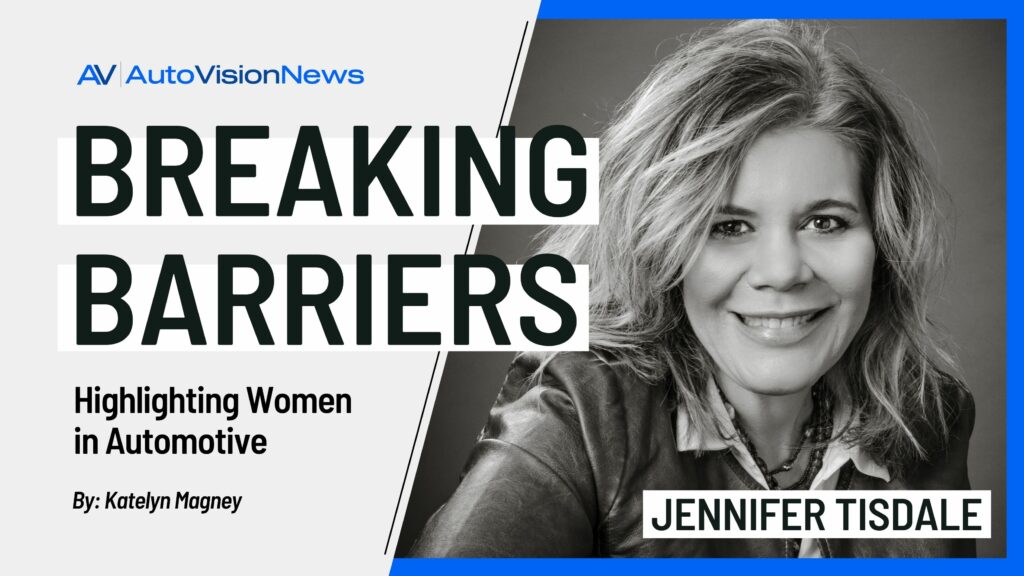Jennifer Tisdale is the CEO of GRIMM, a Michigan-based company specializing in cybersecurity engineering and consulting services to government and commercial clients. Their team works in hardware, firmware, and software across computing, automotive, energy, and more. But according to Jennifer, “I didn’t pick cybersecurity; it picked me.”
Jennifer calls her career journey non-traditional, and after listening to her story, she’s right. In fact, Jennifer’s background is in public policy, media, and government relations. She doesn’t have a degree in computer science or engineering. And 15 years ago, prior to her entry into cybersecurity, the topic wasn’t anywhere near the top of her professional concerns. What led her in that direction was a love for advocacy. More specifically, advocating for an emerging area of cyber-physical systems.
On Standing In Her Own Way
“I am not a cybersecurity professional in the traditional sense,” she said, adding that at the start of her cyber-mobility journey, her biggest obstacle was herself. Jennifer describes a frustration-filled first year as she tried to learn enough of the technical elements of cybersecurity and technology in transportation. Jennifer’s biggest obstacle wasn’t a knowledge gap but rather a belief she didn’t have the right education or background.
What Jennifer experienced is not uncommon, especially for women. It’s something I struggle with often. In fact, I think all the time, what makes me qualified to tell these women leaders’ stories? And I know I’m not alone – a number of studies have found that women tend to struggle with imposter syndrome and discomfort over self-promotion. Unfortunately, this only deepens the gender gap and further separates women and men in the workforce.
After some time, Jennifer hit her stride at work. “Once I began to view the industry through the expertise I did have versus forcing myself to be something I was not, the answers became clearer.” She found the growing industry needed someone to identify and tackle the areas the engineers couldn’t. She found a unique role combining advocacy, education, and business development. She would be supporting a new business model, and so she became a storyteller of an emerging industry.

Mentors Taking Many Forms
Jennifer talked about difficulties finding a mentor, especially in a new field. Although she couldn’t find the ‘perfect match’ of a mentor, she found something else: “I found like-minded souls approaching this emerging space from different perspectives.” In exchange for lessons on the technology side of things, Jennifer offered business insights and communication strategies to help them translate their technical language into a message meaningful to business leaders, politicians, and other non-technical stakeholders they were trying to reach. “In the years since, I have matured to realize that mentors and allies take many forms, and they do not need to be of a certain rank, gender, or age.”
I love Jennifer’s attitude on mentorship. It’s something I identify with – particularly now that I, a (proud) millennial, am no longer a part of the youngest generation in the workforce. If we’re only open to learning from those above us, we’re cutting off a lot of valuable information we may not have otherwise learned.
Uncomfortable Conversations
Given the male-dominated spaces Jennifer has worked in, sexism has been an unfortunate but present element of her career. “I have experienced the over-talking, condescending attitudes, and the disregard for the strategies I was introducing only to have them cheered when restated by a male counterpart,” she recalled.
Jennifer describes how, early on, she would let situations like this pass to avoid confrontation. In fact, she would even analyze the others’ presentations or ideas compared to her own in an effort to understand what she could improve. “Owning the blame was often my ‘go-to’ internal response,” she said, adding that gradually she was able to let that go and start having more productive conversations, even if it was difficult. “It wasn’t fun, often uncomfortable, and emotionally draining, but, at the time, it was like having a superpower,” she added.
“Once I began to view the industry through the expertise I did have versus forcing myself to be something I was not, the answers became clearer.”
Jennifer Tisdale, Chief Executive Officer, GRIMM
Jennifer’s ability to delve into situations like this is incredibly courageous. Any woman knows it can be difficult to have these conversations. It also highlights some of the ways in which women have to go the extra mile to achieve comparable success to their male counterparts. To that point, a recent study has shown women are consistently judged as having less leadership potential than males, making them 14 percent less likely to be promoted each year. The study showed even though women received higher performance ratings, they tended to receive lower ‘potential scores,’ a ranking of how much their managers felt they would grow and develop over time.
Diversity & The Future
During our conversation, Jennifer shared great advice for someone new to the professional world: to be patient with yourself and allow yourself time and space to learn. To have experiences and not be afraid to be different. “Diversity of thought is the ultimate end game on every team and a guarantee to view challenges with a fresh perspective,” she added.
Jennifer’s advice on diversity is exemplified in her own career. “Here I sit, leading an amazing team of cybersecurity researchers, hackers, and testers blended with business acumen and appreciation for the advocacy of the technical work while understanding the nuances from market to market or customer to customer and the ability to effectively tell the story of the importance of the work.” As somebody whose ‘soft skills’ far surpass their technical skills, I appreciate the importance Jennifer places on a holistic and diverse approach to success.
When asked what trends she’s seeing, Jennifer was quick to share how the mobility industry continues to evolve rapidly, adding that connectivity will continue to progress as well. To her, this represents a combination of convenience and cybersecurity concerns. Her outlook on the future is positive, noting that the community of cybersecurity professionals is growing, and people are starting to pay more attention. “In another decade, it is my hope that more consumers will prioritize and hence normalize, a requirement for cybersecurity for consumer goods and services and remove the lingering negative stigma still often attached to the work.”
Thank you to Jennifer for sharing her story with us. To hear more stories from women in the industry, follow us on LinkedIn or subscribe to the AutoVision News newsletter. Or, to be featured, email info@autovisionnews.com.



